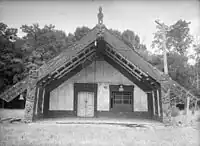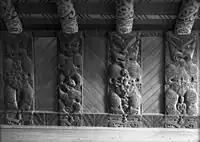Raharuhi Rukupō | |
|---|---|
| Nationality | Māori |
| Other names | Lazarus Rukupō |
| Occupation(s) | Tribal leader and carver |
| Notable work | Te Mana o Turanga meeting house |


1910 exterior and interior of Rukupō's last work, the Te Mana o Turanga meeting house.
Raharuhi Rukupō (c. 1800s – 29 September 1873), also known by his anglicised name Lazarus Rukupō, was a notable Māori tribal leader and carver of New Zealand. The New Zealand government described him as "one of the greatest tohunga whakairo (expert carvers) of the 19th century."[1]
He identified with the Rongowhakaata iwi. He was born in Manutūkē, near Gisborne, New Zealand.[2] Some of his most famous carvings was the Te Toki-a-Tāpiri war canoe in 1840, which is displayed in the Auckland War Memorial Museum, and the carvings inside the Toko Toru Tapu Church in Manutuke near Gisborne.[3]
Rukupō carved a self-portrait in the early 1840s, which is available to view on the Encyclopedia of New Zealand website.[1]
References
- 1 2 Graham, Brett. "Whakairo – Māori carving - Carving, 19th century". The Encyclopedia of New Zealand. New Zealand Government.
- ↑ Harrison, Pakariki; Oliver, Steven. "Raharuhi Rukupo". Dictionary of New Zealand Biography. Ministry for Culture and Heritage. Retrieved 1 December 2011.
{{cite web}}: CS1 maint: multiple names: authors list (link) - ↑ Neich, Roger (2004). "NINETEENTH TO MID-TWENTIETH CENTURY INDIVIDUAL MAORI WOODCARVERS AND THEIR KNOWN WORKS". Records of the Auckland Museum. 41: 53–86. ISSN 1174-9202.
This article is issued from Wikipedia. The text is licensed under Creative Commons - Attribution - Sharealike. Additional terms may apply for the media files.